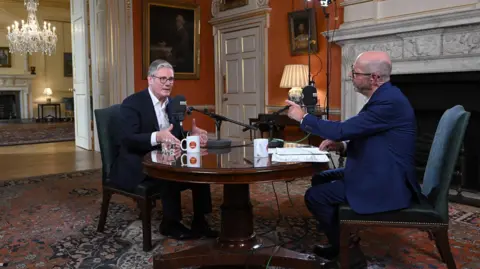The British political landscape is currently experiencing turbulence as Prime Minister Keir Starmer marks the one-year anniversary of his administration. In an exclusive interview with Nick Robinson for BBC News, Starmer addresses a variety of pressing issues that have plagued his time in office, underscoring a narrative of resilience amidst uncertainty. The interview, conducted in the iconic Terracotta Room at 10 Downing Street, serves as a reflective analysis of the challenges and triumphs that characterize Starmer’s leadership, provoking questions about his future direction and commitment to the Labour Party.
As the anniversary approaches, concerns mount regarding Starmer’s effectiveness as a leader and his public perception. Despite appearing poised during the interview, recent events, including emotional displays from Chancellor Rachel Reeves in Parliament, hint at underlying instability. The gravity of these political tensions is exacerbated by speculation regarding the future of key cabinet members and potential repercussions for the stability of his government. Starmer’s narrative emphasizes a desire to maintain focus on his administration’s accomplishments, which include substantial reforms in education and healthcare, alongside successful trade deals aimed at revitalizing the UK economy.
Starmer’s optimism regarding his administration’s achievements contrasts sharply with a list of missteps he openly acknowledges. In recent discussions, he has reflected on hiring Sue Gray, his former chief of staff, and the decision to cut benefits for disabled individuals—moves that have drawn significant criticism. Starmer frames these acknowledgments not as failures but as lessons learned; he defends the need for a pragmatic approach to leadership, which he describes as adapting to new information rather than adhering rigidly to an ideology. This aspect of his character is significant because it aligns with his self-identity as a pragmatic leader who values practical solutions over dogmatic principles.
Yet, amidst acknowledgment of past mistakes, Starmer’s administration has seen substantial detriment, losing not only confidence from party members but also significant financial savings due to the reversal of welfare reforms. A staggering £5 billion loss now looms, necessitating difficult fiscal decisions that could impact public service investments. During the interview, Starmer accepts responsibility but subtly shifts accountability, hinting at the collective nature of political leadership that requires support from allies within the party.
As the conversation progresses, a pivotal theme emerges: the question of leadership narratives. When asked what story he hopes to convey to the public, Starmer emphasizes fairness as his guiding principle. He articulates a vision for a more equitable society where individuals can expect to receive support proportionate to their contributions. This theme of fairness can often feel disconnected from his administration’s achievements and challenges—a gap that many voters may find concerning.
Ultimately, Starmer’s resolve is tested as he navigates the fragile sentiments within his party and the electorate. His appearance of confidence and promise to continue tackling challenges indicates a determination to reinforce his image as a capable leader. However, there’s a palpable sense of skepticism regarding whether his approach will resonate amid widespread concerns regarding popularity and potential party disillusionment.
Starmer’s closing remarks affirm his commitment to his party and reject sentiments of despair. His emphasis on unity within the Labour Party highlights his acknowledgment of internal pressures while simultaneously striving for a cohesive front in confronting future hurdles. In a political environment marked by volatility, the combination of his decisive demeanor, pragmatic approach, and commitment to fairness will be pivotal in shaping the future trajectory of both his administration and the Labour Party at large.
In summation, the interview serves as a critical reflection on Keir Starmer’s first year as Prime Minister, probing the dynamics of effective leadership in challenging times. With pressing issues related to public perception, internal party dynamics, and the broader implications of governance, Starmer’s journey underscores a complex interplay between accountability, vision, and the relentless pursuit of political survival.











